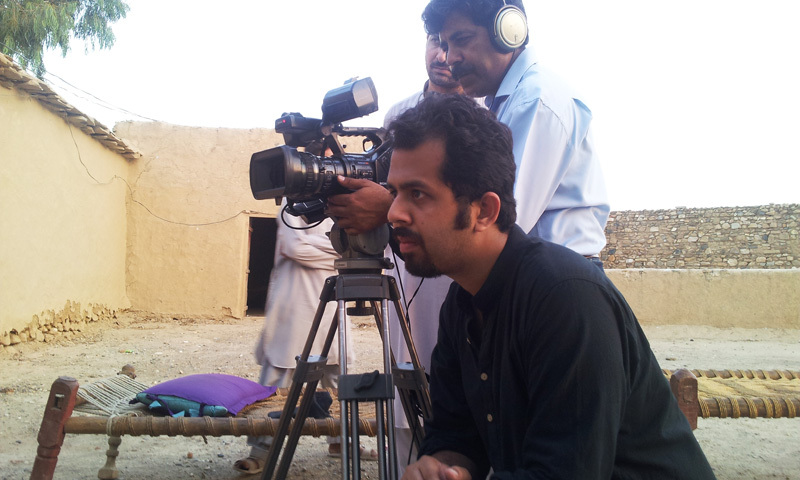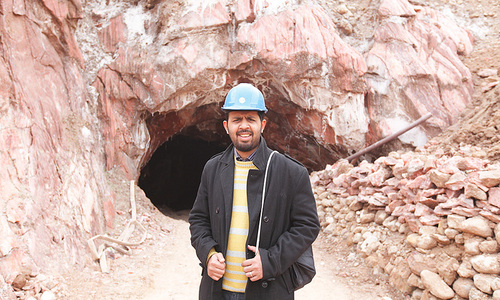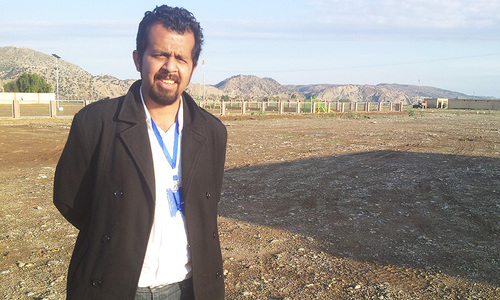Taha Siddiqui: A good fish in a bad pond wins the ‘French Pulitzer’ – by Madeeha Syed
Note (satire) by Syed Riaz Al Hajjaji: The Polio virus is very misunderstood. It represents Bacterial Nationalism against the Occupation by Imperialist Antibodies. We must talk to Polio Virus and not fall into Imperialist Trap of raising awareness against Polio Virus Comrade comrade Taha Siddiqui. Taha Siddiqui puts the D in “Diversity” and teaches us that for every Ansar Abbasi, Najam Sethi and Kamran Khan, there is a Taha Siddiqui and Ayaz Amir at Jang Group
The Award
It was previously awarded only to one journalist a year until they relaxed their rules and included two. And then in 1985, a separate prize was included for audiovisual documentary.
Named after French writer and journalist, Albert Londres, who is credited for having ‘invented’ investigative journalism, the prize has been given out to the best in journalism since 1933. A jury of 19 journalists and winner(s) of the previous year select the recipient. The Albert Londres Prize is often dubbed as the ‘France’s Pulitzer.’
This year, the award went to 30-year-old Pakistani journalist Taha Siddiqui along with his colleagues Julien Fouchet and Sylvain Lepetit for their documentary, La guerre de la polio (The Polio War) for France 24. A shorter version in English can be viewed here. Siddiqui is the first non-French speaking journalist to have won this award.
The jury that awarded the prize released a statement saying that “Julien Fouchet, Sylvain Lepetit and Taha Siddiqui have proven that they know how to treat the subject with respect, care and tact while avoiding clichés such reports usually fall into and which the Albert Londres prize vigourously deplores.”
Humble beginnings
Armed with a management degree from the prestigious Institute of Business Administration (IBA) Siddiqui choose to stay away from the lucrative yet boring life the corporate industry offered him and opted for a less predictable, less paying job as a journalist.
Starting his career from CNBC as a financial analyst, he later went on to do business reporting for Geo. There he was encouraged by his friend and mentor, Ovais Tohid, to try his hand at mainstream reporting. Siddiqui hasn’t looked back since.
After a short stint at Expess TV as a reporter, he did news production at Dunya TV. He joined France24, a television channel based out of Paris, in 2012.
His articles have been published in Dawn, The News, Express Tribune, New York Times, the Christian Science Monitor, Daily Telegraph, etc. to name a few.
Living on the edge
|
Taha Siddiqui on a reporting trip to the Kalabagh salt mines |
This ‘accidental journalist’ as he likes to refer to himself, has worked out of some of the worst conflict zones in the country. From Swat, to the tribal belt alongside Afghanistan, often visiting Taliban-controlled areas in Fata, which include South Waziristan, Mohmand and Khyber Agency.
Siddiqui considers Balochistan as one of the most dangerous areas he’s worked in. He’s reported in areas where Shia killings are rife near Mastung, on the way to the Iranian border. “I felt more at risk there because it’s very remote and absolutely lawless,” said Siddiqui, “Balochistan is a region which is massively underreported, especially the separatist movements there and talking about it can expose one to serious risks — from both state and non-state actors.”
In a vein similar to Balochistan, he feels the media in Gilgit-Baltistan is also extremely limited and controlled — another area he has reported from. “Not much news makes it out into the mainstream, although religious radicalisation in that area should be of concern to everyone,” he said, adding that,
But I believe Pakistan itself is a conflict zone. No area is safe.
Of polio and peril: Making the documentary was ‘risky business’
“It was difficult to accompany polio workers and report on this issue,” relates Sidiqui on the making of the documentary, La guerre de la polio. “It’s just that we’re at risk, but with the camera and the presence of the media team, we were exposing them to more visibility, whereas they would have a low profile, since they are a regular target of religious extremist groups.”
The peril that accompanies polio workers in Pakistan accompanied Siddiqui and his team as well. On more than one occasion did they feel their life was under serious threat.
|
Taha Siddiqui on a reporting trip in South Waziristan
|
During a trip to Orangi Town in Karachi, Siddiqui and his team accompanied a polio worker whose sister had been killed. As they approached the site of the murder, they heard gunshots nearby. “We were told to go away because the ‘influentials’ (militant group) in the area did not like our presence and we could be in danger,” he related, “So we had to leave in a hurry.”
Also while in Karachi, they were pushed out of a newspaper office, which they had visited with the intention of questioning a journalist who had written propaganda articles against the polio vaccine. “The reporter had agreed to meet us at his office but when we arrived and started filming outside his office, his publisher called the security guards who started manhandling us,” said Siddiqui.
During filming in Peshawar, a suicide bombing took place close to where Siddiqui’s team and the polio workers were. “We all had to go into hiding,” he said.
They even suffered physical assault and were pushed out of a mosque in Khyber Pakhtunkhwa when they tried questioning a cleric of that mosque over why he was so firmly against the polio vaccine.
While filming in Lakki Marwat next to Waziristan, Siddiqui met a religious cleric believed to have been close to the Taliban. “I had to push him to answer my questions regarding why he thought polio wasn’t good for children,” he said, “But he kept asking me about my own faith and beliefs. It becomes a problem because we aren’t there to challenge their views but to report on them.”
“Reporting on this issue and really investigating the causes behind the failure of the polio drives has been a very dangerous experience,” Siddiqui said.
“I felt strange because I won the award in the same week that the WHO announced putting restrictions on Pakistanis travelling abroad, making it mandatory for them to get a certification of vaccination,” said Siddiqui, “while at the same time, I was being given the highest media award in Europe.”
“So while in a personal capacity, the award has made me feel good about myself,” related Siddiqui, “As a Pakistani, I feel disappointed knowing that the problem of polio spreading globally is directly linked to Pakistan’s lack of ability to tackle this issue.”
Source :
http://www.dawn.com/news/1106922
Note From Hajjai : The Polio virus is very misunderstood. It represents Bacterial Nationalism against the Occupation by Imperialist Antibodies. We must talk to Polio Virus and not fall into Imperialist Trap of raising awareness against Polio Virus Comrade comrade Taha Siddiqui. Taha Siddiqui puts the D in “Diversity” and teaches us that for every Ansar Abbasi, Najam Sethi and Kamran Khan, there is a Taha Siddiqui and Ayaz Amir at Jang Group.



